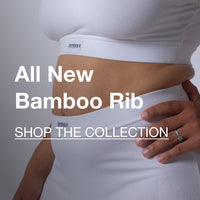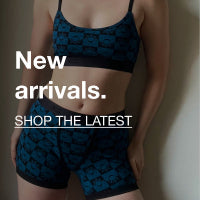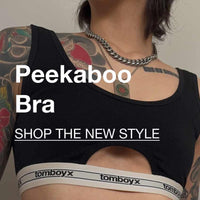Tomboy Tuesday: Andie

Andie Aronow is the Founder and President of Women That Rock, a platform for curating and discovering up-and-coming female and nonbinary musicians. She graduated from NYU’s Clive Davis Institute of Recorded Music in 2011, where she now works as an adjunct. She’s an entrepreneur, an advocate, and a veteran of the professional jingle-singing industry (more on that later). In short, she rocks.
******
TomboyX: To start off, tell me about the Clive Davis Institute.
Andie Aronow: The program has evolved quite a bit since I was there. I graduated in 2011, so it was sort of an earlier iteration of the program. At the time I was there, each class was 24 students. Everyone took the same first two years of curriculum, everything from performance to music theory to engineering and production to digital audio recording and digital audio workstations to music business and contract law and marketing and music writing and PR; it really ran the gamut. Then after your first chunk of time in the program, everyone selected a concentration either for performance, production or business. I selected business and took more courses in that arena and did a whole bunch of internships, adjacent to what I was learning about in school. I'm glad I was there when I was, as a student, because it was an especially intimate environment within NYU.
I joined the department on the faculty side in 2018, and I do professional development, teaching and mentorship. I teach a course called Producing Live Music Events, which is obviously right in my wheelhouse. I've also been appointed CDI’s internship faculty advisor, and most recently the department also hired me to be their events project manager.
TBX: How did Women That Rock come to life?
AA: The story of Women That Rock's birth starts at the beginning of when I got into this industry in the first place, which was when I was seven years old. My dad produces TV commercials, and one day I went with him to record. At the end of the session when the client left and they wrapped up all of the gear and everything, I walked up to my dad. I was like, “can I go play in the vocal booth?” I started singing to myself, thinking that nobody could hear me. It turns out that the owner of the studio had what's called the Talk Back Button on, which means that you can hear what's happening in the vocal booth. He turned to my dad, and he was like, “she could really do this professionally.” Before I knew it, I had a career as a child jingle singer and voiceover artist. I performed on a stage with Celine Dion for the Rosie O'Donnell Christmas Show. I was a Sugar Beat alongside Jesse McCartney. I loved it. I love performing. I loved the music world, I loved being in the studio.
I worked for maybe seven years or so post-college before I was asked to come back to CDI as an adjunct and during that time I experimented in various parts of the music industry at different jobs. I worked in digital marketing and music promotions. I worked in music supervision for film and TV. I did some A&R and executive creative production, and I started to dabble a little bit in artist management, which led me to realize how much help indie artists needed and how there was seemingly a gap for small up-and-coming artists (especially women artists) to figure out how to grow and how to do what they needed to do as independents. I discovered quickly that I wanted to make a more macro impact on helping to elevate these artists. My life is very much female-centric; I am a queer woman and the community that I resonated with most was women. It just kind of became the obvious choice to support and create something that would be supportive of women. I was like, “I'm just gonna start this Instagram page, and I'm just going to feature some artists, and that'll be that.” Then I started to do guerilla-style outreach, social media marketing and reaching out to every female artist page I could find. The inbox exploded. It was just like, “wow, this is something really people want.” I decided in 2019 that I wanted WTR to move into the live event space and produce concerts. One show turned into two years of hosting three shows a month, always prioritizing female and non-binary fronted bills and creating safe spaces for female-identifying people on stage and building community.
[The pandemic] gave me a lot of time and space to evaluate other business ventures outside of the in-person space. I have a few things in the works right now for the company, including a TBA new division. It's all confidential at the moment, but I'm excited to share as soon as I can.
TBX: When you say your shows are “safe spaces,” what does that look like?
AA: Our shows are different. It's very uncommon for a bill to be comprised of all female, non-binary or femme-identifying artists, and that's mandatory for us. That just changes the character of an event: a room not being dominated by men. The nature of femme-led spaces has a different tone. I also approach our shows holistically; usually there's a theme and decor and the venue feels like it embodies our branding. We've done everything from DJs to drag queen emcees to a room full of female local vendors who are selling goods. We've done vintage thrifting pop-up shops. We've done piercing stations, we've had tattoo artists, we also usually find fun integrations, like drink specials. And we also often have brand partners we work with who help facilitate fan activations. We always try to make it feel unique and special and have other things happening in the room, in addition to the music, that gives guests even more of a reason to be there. There ends up being this really beautiful feeling of community and love and respect and fun.
TBX: What’s next for Women That Rock?
AA: First and foremost, the scaling-up of the live events is really a big focus. And those larger-scale events are approaching more quickly than I thought. A revival of the Lilith Fair concept, but cooler and more relevant for today.
TBX: How has your taste in music shifted over time alongside your identity?
AA: I started to explore queerness when I was in college at USC. I discovered The L Word and started watching it compulsively into the beginning of college. Wrapped into my obsession with The L Word was an obsession with Uh Huh Her, a duo of Leisha Haley (who played Alice) and her then partner, Camila Grey. I discovered the Indigo Girls and I went to the last Lilith Fair that ever was. Nowadays I feel like everyone is queer in my world of music and art and culture. I'm a big fan of MUNA. I'm especially passionate about discovering new queer artists and creating space for that.
TBX: What are you passionate about besides music?
AA: I'm passionate about living a full life, filled with experiences and travel. I’m passionate about my family and friendships. I'm passionate about my partner. I'm passionate about creating a life and creating a home. My personal relationships are really important to me. I’m passionate about dismantling the expectations of women tied to what a full and successful life looks like. Work-life balance can be challenging, but I have this beacon of a mission and a purpose and that's just so, so important to me.
TBX: What’s the best show you’ve ever been to?
AA: I got to see Adele in a room of 100 people right when she broke. I was about ten feet from where she was singing, and she was on a stool in a black box room with a guitar player.
Our recent International Women's Day show was pretty frickin’ magical. We had Rozzi headlining, and she's a powerhouse. The room was packed with over 300 people dancing and singing and cheering and celebrating. That's a really magical feeling, you know?
What feels unfortunate to me, is that a lot of the formative memories I have of the best concerts are male artists. I think that that's largely because the expectations of male artists on stage versus female artists on stage are so different. Beyoncé is expected to sing, dance, twirl, jump up and down, be in a million outfits, be on a rocket ship that's launching into space. Whereas, as a child, my parents took me to see James Taylor in a seated theater and it was just him on an acoustic electric guitar, on a stool, on a stage. It was stunning. Beyoncé is not allowed to do that– just SING without all the glam and pyrotechnics. There's just still such an inextricable tie between the way that women look and their musical performances. It’s such an evaluation of their appearance. No one goes to see Dave Matthews Band and is like, “he looks like shit today.” No one judges the show based on his appearance.
TBX: If you were queen of the universe, what would you change?
AA: There are enough resources that exist on our planet for no one to be in a state of such poverty that they are dying. I would love to make it such that we had more access to health care in a more affordable way. I would love to be able to wave a magic wand and get rid of the world's toxic competition and selfishness.
On a slightly smaller scale, if I can keep growing Women That Rock, if I can create a happy, safe, positive space within the clusterfuck of our world, if I can create a space where women feel good and supported and strong, that's pretty good.
*****
You can find Andie @AndieAronow on Instagram, and follow @WomenThatRock to join the fun!






